Zennoun
(religion) A denomination of Buddhism.
Zennoun
(religion) Profound meditation within that denomination of Buddhism.
Zennoun
An approach to an activity, skill, or subject that emphasizes simplicity and intuition rather than conventional thinking or fixation on goals.
Zenadjective
(religion) Pertaining to this denomination of Buddhism.
Zenadjective
(colloquial) Enlightened, unburdened and free of worries; chill, extremely relaxed and collected.
Zennoun
school of Mahayana Buddhism asserting that enlightenment can come through meditation and intuition rather than faith; China and Japan
Zennoun
a Buddhist doctrine that enlightenment can be attained through direct intuitive insight
Zennoun
street name for lysergic acid diethylamide
Zennoun
a Japanese school of Mahayana Buddhism emphasizing the value of meditation and intuition rather than ritual worship or study of scriptures.
Zen
Zen (Chinese: 禪; pinyin: Chán; Japanese: 禅, romanized: zen; Korean: 선, romanized: Seon; Vietnamese: Thiền) is a school of Mahayana Buddhism that originated in China during the Tang dynasty, known as the Chan School (Chánzong 禪宗), and later developed into various sub-schools and branches. From China, Chán spread south to Vietnam and became Vietnamese Thiền, northeast to Korea to become Seon Buddhism, and east to Japan, becoming Japanese Zen.The term Zen is derived from the Japanese pronunciation of the Middle Chinese word 禪 (chán), an abbreviation of 禪那 (chánnà), which is a Chinese transliteration of the Sanskrit word dhyāna ().
Buddhismnoun
The religion based upon the doctrine originally taught by the Hindu sage Gautama Siddartha, surnamed Buddha, "the awakened or enlightened," in the sixth century b. c., and adopted as a religion by the greater part of the inhabitants of Central and Eastern Asia and the Indian Islands. Buddha's teaching is believed to have been atheistic; yet it was characterized by elevated humanity and morality. It presents release from existence (a beatific enfranchisement, Nirvâna) as the greatest good. Buddhists believe in transmigration of souls through all phases and forms of life. Their number was estimated in 1881 at 470,000,000.
Buddhismnoun
a religion represented by the many groups (especially in Asia) that profess various forms of the Buddhist doctrine and that venerate Buddha
Buddhismnoun
the teaching of Buddha that life is permeated with suffering caused by desire, that suffering ceases when desire ceases, and that enlightenment obtained through right conduct and wisdom and meditation releases one from desire and suffering and rebirth
Buddhismnoun
a widespread Asian religion or philosophy, founded by Siddartha Gautama in north-eastern India in the 5th century BC.
Buddhism
Buddhism (, US: ) is an Indian religion based on a series of original teachings attributed to Gautama Buddha. It originated in ancient India as a Sramana tradition sometime between the 6th and 4th centuries BCE, spreading through much of Asia.










